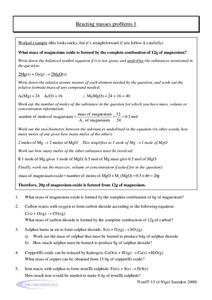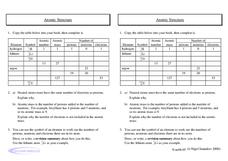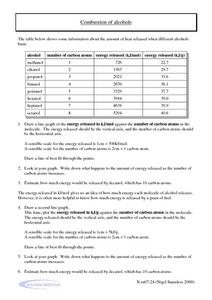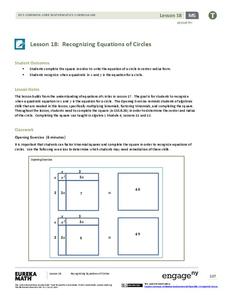Curated OER
Reacting Masses Problems
For this chemical reactions worksheet, students follow steps to determine the mass of compounds formed by the combustion of an element. This worksheet has 5 problems to solve.
Curated OER
Atomic Structure
In this elements worksheet, learners complete a graphic organizer by filling in the element symbol, atomic number, atomic mass, and the number of protons, electrons, and neutrons. Then students complete 2 short answer questions.
Creative Chemistry
Reactivity Series Questions
For this reactions worksheet, students read about two types of reactions that take place between metals: displacement and competition. Then, they answer two problems.
Creative Chemistry
Combustion of Alcohols
For this combustion worksheet, learners complete two problems using a table showing the amount of heat released when different alcohols burn. They then create two graphs plotting the energy release against the number of carbon atoms.
Creative Chemistry
Reactions of Group 1 Metals With Water
In this elements learning exercise, students complete a graphic organizer comparing lithium, sodium, and potassium observations. Then, they determine how these elements react with water. Students complete three fill-in-the-blank questions.
Creative Chemistry
Alkanes and Alkenes
In this alkanes activity, students use a data table to plot a graph of boiling point against the number of carbon atoms. They also define cracking and double bonds. This activity has five short answer questions.
Curated OER
Use of Common Metals
In this metals worksheet, students read about the different properties of aluminum, copper, and iron and determine why these metals are used they way they are used. This worksheet has 5 short answer questions.
Curated OER
Working Out Empirical Formulae
In this chemical compounds worksheet, students learn the steps for determining the empirical formula of a compound and then complete 3 problems.
Curated OER
Chemical Equations
For this chemical equations worksheet, students are given the trends for the reactions between the alkaline earth metals with water, the solubility of the Group II hydroxides and the solubility of the Group II sulphates.
Creative Chemistry
Physical and Chemical Trends in the Group 7 Elements
In this elements worksheet, high schoolers complete a graphic organizer by comparing the elements' melting point, boiling point, density, and electronic configuration. Students determine the characteristics of Group 7 elements. This...
Curated OER
Parkour Meets Trampolining
The Learning Network has created 7 questions on the posted video "Parkour Meets Trampolining". This is a really cool video and will stimulate much discussion among your class. There is a lot of room to create new questions to help pupils...
Curated OER
Analyzing Congruence Proofs
Looking at numerous examples of triangles, each with different properties, geometers develop their understanding of congruency. They use the notation of a counter-example to disprove certain conjectures and prove geometric theorems and...
National Math + Science Initative
Introduction to Decimals
Three activities make up an introductory lesson designed to create a strong foundation in comparing fractions to decimals and exploring and building decimal models. Pupils brainstorm and complete a Venn diagram to show how decimals and...
EngageNY
Mid-Module Assessment Task: Grade 8 Module 7
Assess pupil understanding of rational and irrational numbers with a mid-module assessment that is the 15th lesson in the 25-part series. The questions represent the objectives in the first half of the series. Topics include decimal...
EngageNY
Mid-Module Assessment Task - Precalculus (module 1)
Individuals show what they know about the geometric representations of complex numbers and linearity. Seventeen questions challenge them to demonstrate their knowledge of moduli and operations with complex numbers. The assessment is...
EngageNY
End-of-Module Assessment Task: Grade 8 Module 1
It's all in the numbers. Determine your pupils' level of understanding of scientific notation using this assessment task. The final lesson in the series assesses scholars on the application of scientific notation in real-life...
EngageNY
Factoring Expressions
Factor in an informative resource when teaching about factoring. The 11th lesson in a 36-part module shows pupils how to factor algebraic expressions by applying the distributive property. Some of the problems involve expressions with...
Wish for the Future
Wish for the Future
What would be your class's ideal world 30 years in the future? What about 100 years? Use a series of activities to discuss globalization, sustainability, scientific contributions to society, and the global community of which your...
EngageNY
Recognizing Equations of Circles
What does completing the square have to do with circles? Math pupils use completing the square and other algebraic techniques to rewrite equations of circles in center-radius form. They then analyze equations of the form x^2 + y^2 + Ax +...
Utah Education Network (UEN)
Probability and Statistics
MAD about statistics? In the seventh chapter of an eight-part seventh-grade workbook series, learners develop probability models and use statistics to draw inferences. In addition, learners play games and conduct experiments to determine...
EngageNY
Dilations on the Coordinate Plane
Dilations from the origin have a multiplicative effect on the coordinates of a point. Pupils use the method of finding the image of a point on a ray after a dilation to find a short cut. Classmates determine the short cut of being...
EngageNY
End-of-Module Assessment Task: Grade 8 Module 5
Give your class a chance to show how much they've learned in the module with an end-of-module assessment task that covers all topics from the module including linear and non-linear functions and volumes of cones, cylinders, and...
EngageNY
Mid-Module Assessment Task: Grade 7 Module 2
A seven-question assessment determines how well your learners understand the procedures to add, subtract, multiply, and divide signed rational numbers. Pupils show their understanding through problem-solving situations.
EngageNY
From Rates to Ratios
Look at rates from a general perspective. The 17th part of a 29-part series provides problems that help pupils develop more general ratios from given rates. Scholars determine unit rates and ratios that are associated with given rates....
Other popular searches
- Creative Writing Short Story
- Creative Writing Assignments
- Esl Creative Writing
- Creative Writing Activities
- Creative Writing Ideas
- Creative Writing Poetry
- Creative Writing Units
- Creative Writing Homework
- Creative Writing Lessons
- Character Creative Writing
- Creative Writing Prompt
- Imaginative Writing Prompts

























